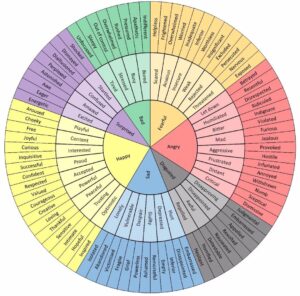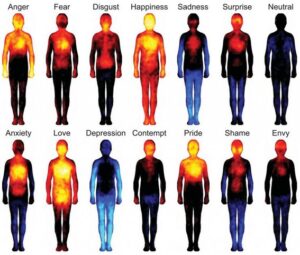Emotional Literacy
Many of us are not taught the language of emotions, or have times where it is hard to say how we feel. Research also suggests there are benefits to simply writing down emotions you are feeling throughout the day.
- What emotions do for you: We are actually Homo Projectus, emotions prepare us for survival in the immediate future.
- Factors that make regulating emotions hard: Lack of skills, reinforcing consequences, moodiness, rumination/ worrying, myths about emotions, and biology can interfere with changing emotions.
- A model for describing emotions: Emotions are complex responses, also changing any part of the system can change the entire response.
- Ways to describe emotions: Learning to observe, describe, and name your emotion can help you regulate your emotions.
- Sporadically throughout the day, at least 2-3 times, take a moment to write down how you feel. Use the wheel below, moving from middle, core emotion, and serif you can more outward to more specific feelings.
- At the end of the day or week, see if you can find any patterns.

A further resource, emotions often can be felt in these areas
Bonus! A wheel for suggestions of what to do during these emotions:

A final note, anger is sometimes called the emotional bodyguard. Anger is an active and empowering feeling that often is expressed in place of passive, dis-empowering feelings. If you find yourself beginning with anger, write down the word that feels most appropriate, then consider what other feelings may be underneath that. If any emotion becomes overwhelming, try some self soothing strategies.
Have any thoughts, questions, suggestions, or comments on this article? Wondering how to this can be applied, modified, or adapted to your polyamorous, swinging, kink/ BDSM, or otherwise interesting relationship? Feel free to reach out to us here.
